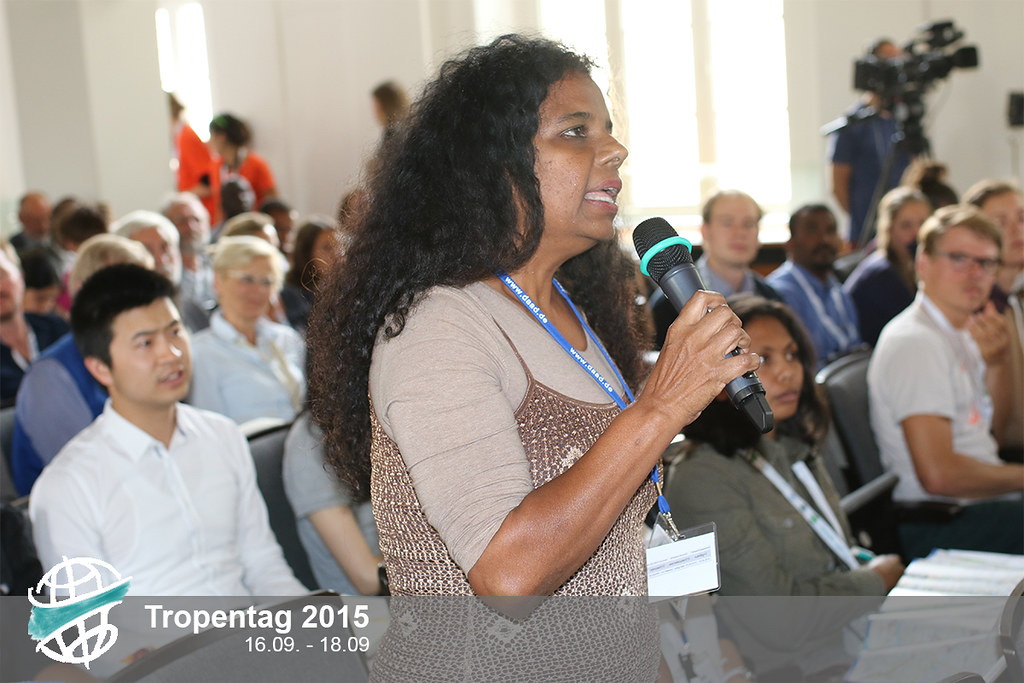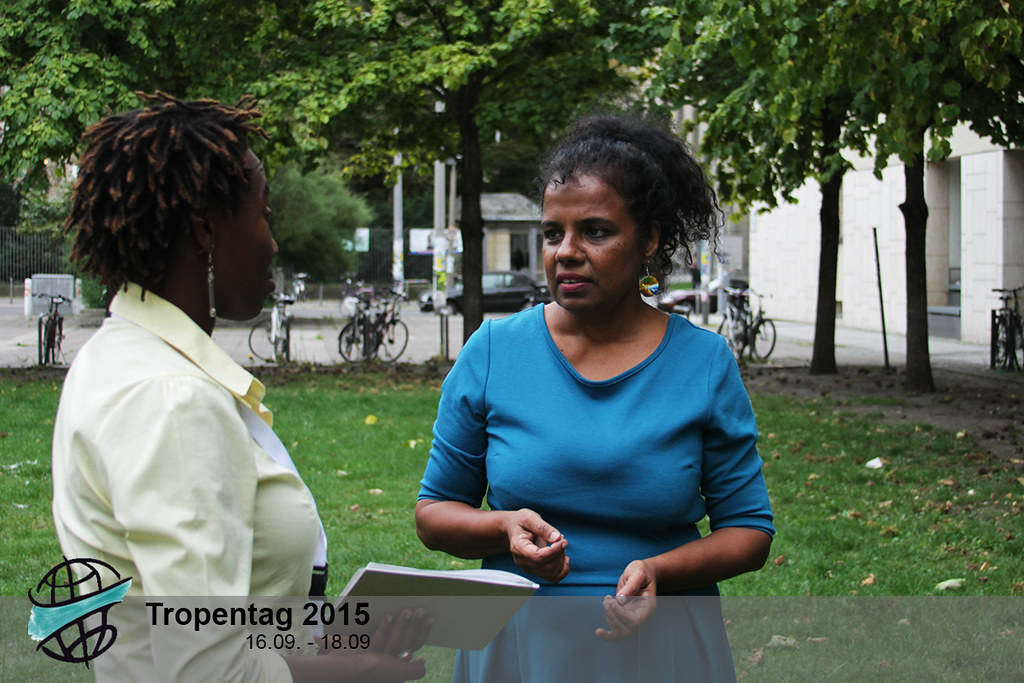Reply to comment
One Woman's Different Story of Tropentag
Fri, 09/18/2015 - 21:41 — Grace MwauraTell us a little bit about yourself
I was born in Fiji Islands and schooled in the UK (Bsc in Biochemistry and Physiology), Germany and the US. After my PhD in Environmental Sciences on a DAAD scholarship in Germany, I went to Sri Lanka where I started working with communities in recycling waste.
 Dr. Perera asking a question during the opening plenary
Dr. Perera asking a question during the opening plenary
Why waste?
When I first arrived in Sri Lanka and saw the waste, I knew this was what I had been called to do. I had not studied solid waste in my PhD, but I was convinced that I needed to work with the communities living close to and depending on the dumpsites. These were poor families who were seen as nothing. They were seen as garbage. I introduced recycling to the communities and we worked together to improve their livelihoods.
What was this experience like?
It was an experience that completely changed my life. These waste pickers had no voice, so I became their voice. I am the one who introduced waste recycling to them, and so had to battle with two things: the politics in the country, but also the socio-economic status of the waste pickers. We needed to ensure that the waste recycling activities generated incomes that would improve their socio-economic status. There were no formal schools in the community, and parents had no means to send their children to other schools. So, I introduced an informal school, and eventually some of the children would be integrated into formal schools.
People started calling me the garbage lady when I started talking about solid waste on the TV and media, but eventually they also started to change and respect the work I was doing. I am the one who developed the Sri Lanka National Policy on Solid Waste Management and have been an advisor to their Minister for Environment. But even as I rose through the ranks, I have always gone back to see these waste pickers. They completely changed me.
What were the most challenging but exciting moments?
During the 30 years of civil war in Sri Lanka, the police would arrest my waste pickers thinking they were terrorists. So I developed identity cards for them, so that they would not be arrested. I also had to interact with the terrorists when protecting my waste pickers, times I would try to teach them some environmental knowledge. In 2011, I was the US Embassy Nominee for the most courageous woman. Through working with terrorists and waste pickers, I gained a lot of strength, confidence and experience.
What then motivates you to attend a conference like Tropentag which has little to do with solid waste?
I am here to share the knowledge I have learnt from Sri Lanka with other communities. I have come to realize that in all countries we face almost the same problems, and these can be tackled with the experiences we have gained in other situations. I also believe that women are strong-willed and can drive change in our communities. I am very proud of what I achieved and my whole life has changed a lot.
What then are you doing in Fiji?
Right now Fiji is confronted with climate change, and being a small country, it is assumed that the people can just move to another country. But the sad thing is that, as the island shrinks due to rising sea level, our culture and our history as the people of Fiji also goes. On the other hand, there is ongoing destruction of natural resources, especially mangroves and marine resources. Because hotels are very close to the beaches that are shrinking, this affects the tourism industry on which our economy is dependent. The issue of solid waste is massive, with most of it making it to the beaches.
 Grace Mwaura interviews Dr. Perera
Grace Mwaura interviews Dr. Perera
One of my projects is to conduct beach clean-ups and mangrove planting. In two months, I worked with the community to plant over 1600 mangroves. I have also improved the diversity of plants by planting 950 different species of plants at the Botanical Garden during the World Environment Day this year. I encourage the community to label each tree they plant so that there is ownership and memory in our acts of service. In Lautoka area, the second largest city in Fiji, the US Embassy has funded me to establish school environmental clubs where I teach young people on climate adaptation. I am also working with church groups because I realized that these too are important entry points if we want to see behavioural change. In all these projects I use my experience from Germany, UK, the US and Sri Lanka to address the challenges in Fiji.
Do you have any hope for Fiji?
I believe Fiji is not going to be destroyed. Adaptation is a possibility, and with young people in the country, this is a generation with hope for the future. We can set a good example for Tuvalu and show that adaptation is a possibility even with the impacts of climate change. When I recently met with the Prime Minister of Tuvalu, I was touched by his speech when he said, ‘All I am trying to do is to protect my country’. I have been inspired by his words and I believe that my work in Fiji can be replicated in Tuvalu and other countries.
What message do you have for Tropentag participants?
I attend conferences because I believe that, besides being a professor and having many publications, we are expected to offer much more. These conferences give me a chance to share and bring change beyond those titles. People must learn to give what they have learnt. Young people especially need not be scared of taking up challenges, even when others think you are crazy. I have learnt from my experience, even after many years of being called a garbage lady, I have the privilege of working at the local and global levels. My voice can be heard, and that’s why I came to Tropentag to share the knowledge that I have.
Thank you very much!
We hope this will be an inspiration to the young researchers attending Tropentag. Besides the main challenge of food security addressed at this conference, there are many others challenges that require your energy, enthusiasm, and the education you have attained. Don’t be scared to take the challenge; we all can tell a different story of Tropentag.




